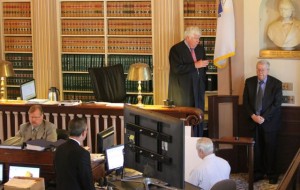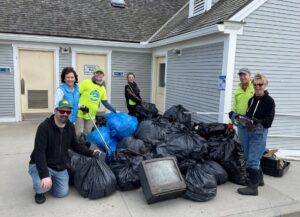
CCB MEDIA PHOTO
Barnstable Superior Court Judge Gary Nickerson cautions the jury about evidence from cell phone expert Scott Baxter, who is on the witness stand.
BARNSTABLE – Cell phones’ ability to track people’s movements whether the caller is aware of it or not was front and center at the murder trial of Quoizel Wilson in Barnstable Superior Court Monday.
Wilson, a former Centerville resident, is accused of first degree murder in the shooting death of Trudie Hall of Nantucket in July 2010. Hall’s body was found almost two years later in woods off Hayway Road in the Hatchville section of Falmouth.
In Monday’s testimony, the prosecution brought out a cell phone expert, Scott Baxter, of Nashville, Tennessee, who tracked the movements of Wilson’s phone during the night Hall disappeared.
In interviews with police, Wilson said he was having an affair with Hall and was likely the father of her unborn child. He said Hall had told him she wanted to move to Florida but he said he was against the move because he wanted to be part of the baby’s life.
Trooper Mark Powell, with state police out of the Cape & Islands District Attorney’s Office, said during those interviews, Wilson did not seem concerned that Hall was missing. “He did not appear to be nervous regarding the missing Trudie Hall, the disappearance of her. But Mr. Wilson stated that he was concerned about how it looked for him,” Powell said of the defendant’s demeanor during questioning.
In a recorded interview played for the jury, investigators pressed Wilson about his whereabouts the night Hall went missing. Wilson admitted to meeting Hall at the Bayside Resort in West Yarmouth where she was staying and having sex with her there. But he said he did not see her after that and did not leave his home that evening.
But when police told Wilson his cell phone records placed him outside his home that night, Wilson admitted to leaving his home to meet an associate to do a drug deal on Service Road between exits 4 and 5 in Barnstable.
According to the cell phone records, Baxter testified, Wilson’s phone ended up all the way in the Hatchville section of Falmouth near an unusually small cell phone tower close to the wooded site off Hayway Road where Hall’s remains were found. The records show Hall’s phone was also in that same area. Powell said there was also a period of time that Wilson had not accounted for.
Powell said, “I explained that from his story, the time that he went out to do the supposed drug deal to the time when he arrived home, as well as the phone call after midnight, that there was a two-hour gap that he couldn’t account for time where he was. He had no explanation for that.”
Powell said he continued to question Wilson.
“I again asked him if he was sure that he didn’t go anywhere else. I asked him if he had his cell phone with him all night, which he stated that he did. I asked him if he was sure he didn’t go down in Mashpee or as far as down into Falmouth, which he stated that he did not go that far down,” Powell testified.
Barnstable Superior Court Judge Gary Nickerson cautioned prosecutor First Assistant District Attorney Michael Trudeau that the cell phone expert Scott Baxter was not to lecture to the jury and was to include only factual information and no inferences. Nickerson said, Baxter’s PowerPoint presentation needed to be edited to exclude any slides that indicated that Wilson or Hall were in a certain location, as opposed to their phones being in a certain location.
Baxter’s testimony took jurors on a tour of Wilson and Hall’s phone whereabouts the evening of July 27, 2010. Hall’s mother and husband reported her missing the next morning.
Using cell towers that transmitted calls, texts, and data made by the two phones, Baxter said the phones went from the Bayside Resort to the commuter lot in West Barnstable where Hall’s car was found bloody and abandoned the day after she disappeared.
The phones then were on the Service Road in Barnstable and later that night they were both transmitting calls via an especially small cell tower near the woods where Hall’s body was found.
At 11:11 p.m. on July 27, 2010, Wilson’s phone made a call from that small tower near Hayway Road in Falmouth to his wife’s phone in Centerville.
The fact that the small tower handled the signal from Wilson’s call placed Wilson near the site, Baxter said of the signal.
“For it to be strong enough, that phone had to be very close to [the tower],” Baxter said.
Hall’s phone was detected several days later from Allied Waste’s facility in Rochester.
Wilson was a garbage man for Allied Waste. His route took him by the woods on Hayway Road where Hall’s body was discovered.
Nickerson cautioned jurors that Baxter’s testimony was to be taken with the same weight as any other civilian witness who has testified in the case. “This witness is only as good as the evidence he is presented with. His credibility is up to you,” he said.
Nickerson also wanted to ensure that cell phone records presented to the jury concerned times when phones were used as opposed to data collected automatically from cell phone towers.
Baxter assured Nickerson and defense attorney Robert Galibois that the records he was presenting were gathered only when the phones were being used.
Jurors also heard from Falmouth Police Patrolman Thomas Maguire who was the first to respond to the scene on Hayway Road when a man walking his puppy in the woods came upon Hall’s skull and called police.
As Maguire testified, Hall’s mother, Vivienne Walker, sitting by herself in the courtroom, put her head down and sobbed.
By LAURA M. RECKFORD, CapeCod.com News Editor























